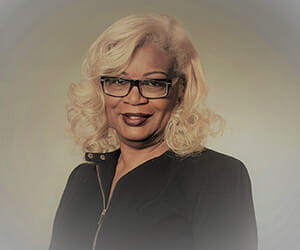When Dr. Melanye Smith was a rookie police officer, a citizen saved her life. She arrived at an apartment to collect details on a reported robbery and remembers carrying her radio in one hand and papers and a clipboard in the other.
As soon as she entered the building, an occupant quickly pulled Dr. Smith into her apartment. She turned around and saw three men outfitted in trench coats with sawed-off shotguns. The officer realized how dangerous the situation she was in, knowing there was only one way in and out of the building.

This incident was a pivotal moment for Dr. Smith. It solidified her belief in community policing, which encourages officers to create strong bonds with the citizens living and working in their beat areas. Now, 25 years later, she trains police officers in community-oriented policing.
By proactively engaging with residents, police officers can help to prevent crime from happening instead of responding to incidents after they occur. Early in her career as a police officer in Washington, D.C., Dr. Smith’s goal was to use this way of thinking to tackle crime around five public housing developments.
In addition to her law enforcement role, she acted as a liaison by bringing together the schools, neighborhood leaders, businesses and faith-based communities. She set up a safe house where young people could congregate during the traditionally high crime periods between 3 to 11 p.m. Businesses donated money to supply computers, and individuals volunteered tutoring time. Police officers staffed the center to create valuable community connections.
“This was probably one of the most rewarding times of my career,” says Dr. Smith. “Community policing is a philosophy that should be implemented based on the needs of the community. This program effectively reduced juvenile crime in and around those areas.”
During Dr. Smith’s time on patrol, she also worked to reduce juvenile crime in another area of the city by tackling the root problem of truancy. She created a center where suspended or expelled students could complete schoolwork, keeping them off the streets. Additionally, she developed free parenting classes in coordination with the U.S. Department of Health and Human Services to create a better support system for the children in her area.
“When we start looking holistically at the problems we face in society, our strategies will be more effective,” says Dr. Smith. “It’s about connecting with people and building relationships. Just because you have to enforce the law doesn’t mean you don’t have to know everyone in your community.”
Several years ago, Dr. Smith made the transition from working on the frontlines to training the next generation of police officers. She emphasizes officer wellness, emotional intelligence and self-awareness, catered to the distinct challenges law enforcement professionals face.
“De-escalation, community policing and officer wellness are all interrelated,” says Dr. Smith. “I believe you can’t take care of other people until you can take care of yourself. We live with the complexities of policing in the 21st century where the demand is so high for street-level officers, and they are often targeted because of the badge they wear.”
Dr. Smith teaches new officers about physiological responses in their bodies so they can control them better in the field. This includes amygdala hijack, a phenomenon in the brain that leads to the fight or flight response. She explains that blood will leave an individual’s brain to protect their vital organs during highly charged situations.
“When you understand what happens in your own body during dangerous situations, that gives you better insight into what the person you’re interacting with might also be experiencing,” says Dr. Smith. “You have to be able to step away from a situation and depersonalize it.”
Dr. Smith believes in placing a greater emphasis on teaching officers how to manage stress during entry-level training. She instructs them on ego depletion, which happens when people use their limited pool of mental resources. As a result, they cannot exert the same level of self-control in subsequent situations, causing them to react in ways they wouldn’t otherwise. Smith stresses the need to find ways to renew and reinvigorate themselves through wellness.
Controlled breathing is another critical skill she teaches. Dr. Smith finds the first thing officers do in volatile situations is hold their breath, which automatically causes blood pressure and heart rates to rise, exacerbating scenarios.
“It can make all the difference in the world because I’m teaching them to become self-aware,” says Dr. Smith. “The more self-awareness you have, the more control you have over a situation.”
In addition to her work with new officers, Dr. Smith continues to share community policing principles with cities and towns to help tackle their individual concerns. In Fairfax County, Virginia, she collaborated with parents and psychologists to help tackle drug- and suicide-related issues. Dr. Smith has also worked with several jurisdictions in Southern Maryland to develop de-escalation training.
“I love the philosophy of positive social change and making a difference, and that’s why I love working at Walden,” says Dr. Smith. “I think we all can make a difference in our sphere of influence. Mine happens to be in law enforcement.”



